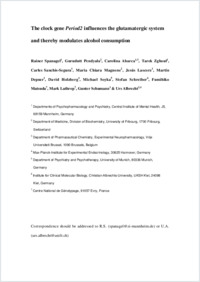The clock gene Per2 influences the glutamatergic system and modulates alcohol consumption
- Spanagel, Rainer Departments of Psychopharmacology and Psychiatry, Central Institute of Mental Health, Mannheim, Germany
- Pendyala, Gurudutt Department of Medicine, Division of Biochemistry, University of Fribourg, Switzerland
- Abarca, Carolina Departments of Psychopharmacology and Psychiatry, Central Institute of Mental Health, Mannheim, Germany - Department of Pharmaceutical Chemistry, Experimental Neuropharmacology, Vrije Universiteit Brussel, Brussels, Belgium
- Zghoul, Tarek Departments of Psychopharmacology and Psychiatry, Central Institute of Mental Health, Mannheim, Germany
- Sanchis-Segura, Carles Departments of Psychopharmacology and Psychiatry, Central Institute of Mental Health, Mannheim, Germany
- Magnone, Maria Chiara Department of Medicine, Division of Biochemistry, University of Fribourg, Switzerland
- Lascorz, Jesús Departments of Psychopharmacology and Psychiatry, Central Institute of Mental Health, Mannheim, Germany
- Depner, Martin Departments of Psychopharmacology and Psychiatry, Central Institute of Mental Health, Mannheim, Germany
- Holzberg, David Max-Planck-Institute for Experimental Endocrinology, Hannover, Germany
- Soyka, Michael Department of Psychiatry and Psychotherapy, University of Munich, Germany
- Schreiber, Stefan Institute for Clinical Molecular Biology, Christian-Albrechts-University, Kiel, Germany
- Matsuda, Fumihiko Centre National de Génotypage, Evry, France
- Lathrop, Mark Centre National de Génotypage, Evry, France
- Schumann, Gunter Departments of Psychopharmacology and Psychiatry, Central Institute of Mental Health, Mannheim, Germany
- Albrecht, Urs Department of Medicine, Division of Biochemistry, University of Fribourg, Switzerland - Max-Planck-Institute for Experimental Endocrinology, Hannover, Germany
-
19.12.2004
Published in:
- Nature Medicine. - 2004, vol. 11, no. 1, p. 35-42
English
Period (Per) genes are involved in regulation of the circadian clock and are thought to modulate several brain functions. We demonstrate that Per2Brdm1 mutant mice, which have a deletion in the PAS domain of the Per2 protein, show alterations in the glutamatergic system. Lowered expression of the glutamate transporter Eaat1 is observed in these animals, leading to reduced uptake of glutamate by astrocytes. As a consequence, glutamate levels increase in the extracellular space of Per2Brdm1 mutant mouse brains. This is accompanied by increased alcohol intake in these animals. In humans, variations of the PER2 gene are associated with regulation of alcohol consumption. Acamprosate, a drug used to prevent craving and relapse in alcoholic patients is thought to act by dampening a hyper-glutamatergic state. This drug reduced augmented glutamate levels and normalized increased alcohol consumption in Per2Brdm1 mutant mice. Collectively, these data establish glutamate as a link between dysfunction of the circadian clock gene Per2 and enhanced alcohol intake.
- Faculty
- Faculté des sciences et de médecine
- Department
- Département de Biologie
- Language
-
- English
- Classification
- Medicine
- License
- License undefined
- Identifiers
-
- RERO DOC 4324
- DOI 10.1038/nm1163
- DOI 10.1038/nm0205-233c
- Persistent URL
- https://folia.unifr.ch/unifr/documents/299673
Statistics
Document views: 119
File downloads:
- 1_albrecht_cgp.pdf: 544
